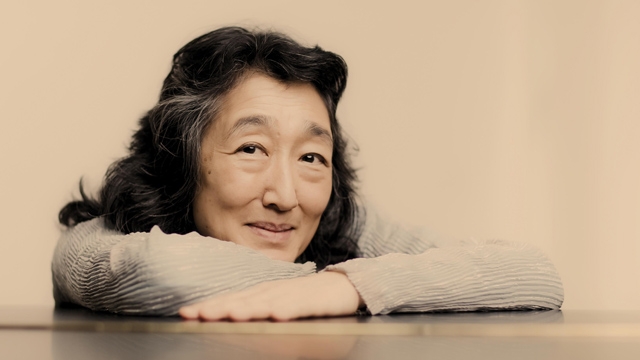Uchida reveals the mundane and transcendent in Beethoven’s “Diabelli” Variations
Pianist and conductor Mitsuko Uchida began her annual Chicago residency with a piano recital given to a packed house Sunday afternoon at Symphony Center.
Going along with the season-long focus that music director Riccardo Muti has placed on Schubert and also serving as a precursor to Uchida’s performance of the Trout Quintet with Chicago Symphony players at this week’s CSO subscription concerts, Uchida opened the program with Schubert’s Piano Sonata in G Major, D. 894.
That Uchida’s Schubert would be anything less than technically of the highest order and would plummet into the inner meanings of the music have become givens. What did come across as a surprise, however, was the unbridled joy with which the music rolled forth from her fingers.
The waltz unfolded in a life-affirming, almost dreamlike manner, and its resurgence in the finale became a callback to Schubert’s Viennese roots. Along the way, Uchida offered playful rubato and lots of dynamic contrast. The Andante was poetic in its majesty and set up the ferocity of the opening phrases of the Menuetto which were answered in an almost pastoral fashion.
Given that the rest of the program was given over to Beethoven’s Diabelli Variations, Op. 120, it was as if Uchida wanted to remind us what bits of a real Viennese waltz sounded like in contrast to the Anton Diabelli’s faux waltz that Beethoven uses as the basis for the most important set of variations composed since Bach’s Goldberg Variations.
Uchida’s initial unaltered statement of Diabelli’s mundane waltz tune was delightfully vulgar, deliberately emphasizing its simpleton qualities while skillfully avoiding parody.
Without pausing, Uchida kept up the naïve plodding of the original whole isolating its rhythm before smudgily breaking up the phrases and starting to show some restraint. All of these early variations managed to keep some crude element of the original spotlighted while slowly, but surely, beginning to reveal Beethoven’s deconstructive transfiguration.
Bach is a constant model, both toccata-like passages and canons, later fugues, always with humor, although few pianists are as fearless to reveal the satirical sides of the piece with the skill and abandon that Uchida did.
When sections needed to be introspective, Uchida would accommodate, but when Beethoven would break new ground, Uchida seemed determined to show just how much ground was being broken compared to the Diabelli original.
By the time a Mozart paraphrase enters in during Variation 22, Uchida, a most skillfull Mozartean, treated it as a welcome absurdity, almost a reminder that there are other and far better themes out there than the silly one we’ve been hearing.
A corner is turned at that point, and Uchida’s performance was equal to the transformative ascent ahead that by the variation 31 largo, became evocative, unbridled longing before a grand fugue and a shimmering, tranquil conclusion.
The audience knew it had been on a very special journey, and let it all soak in quietly before an instantaneous roar and standing ovation which seemed to genuinely touch Uchida. Several slow and deliberate curtain calls continued on before it was clear that there really was no other musical place else for either soloist or audience to go from there.
Mitsuko Uchida conducts and performs music of Schubert and Mozart with the Chicago Symphony Orchestra on March 13, 14, 15 and 18 and performs the Schumann Piano Concerto with Riccardo Muti and the CSO on March 20, 21 and 22; 312-294-3000; cso.org.
Posted in Performances






Posted Mar 15, 2014 at 7:22 am by Dennis McCann
Even this inspired review could not capture all of this transcendent performance. An afternoon for the ages! Uchida is a gift to our souls, hearts, and spirits, interpreting the classicists to show how much they have created us! Then, humbly, she signed CD’s afterward, and I asked her sign this program as well, which I will have framed!